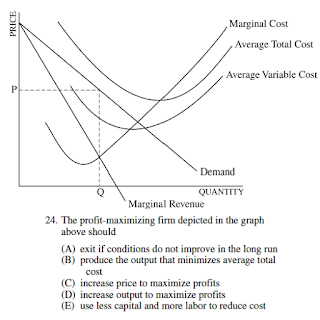2012 Multiple Choice
(Monopoly, Natural Monopoly, Monopolistic Competition)
Monopoly Cheat Sheet here
Monopolistic Competition Cheat Sheet here
Natural Monopoly
Answer - (C) Long-Run ATC decrease as output increases
This is a recognition problem,
What is a natural monopoly?
For a natural monopoly the long-run average cost curve (LRAC) falls continuously over a large range of output. The result may be that there is only room in a market for one firm to fully exploit the economies of scale that are available
There are several interpretations of what a natural monopoly us
- It occurs when one large business can supply the entire market at a lower price than two or more smaller ones
- A natural monopoly is a situation in which there cannot be more than one efficient provider of a good. In this situation, competition might actually increase costs and prices
- It is an industry where the minimum efficient scale is a large share of market demand such there is room for only one firm to fully exploit all of the available internal economies of scale
- An industry where the long run average cost curve falls continuously as output expands
- Private utilities are natural monopolies in local markets
The key point is that a natural monopoly is characterized by increasing returns to scale at all levels of output – thus the long run cost per unit (LRAC) will drift lower as production expands. LRAC is falling because long run marginal cost is below LRAC. This can be illustrated in the diagram above. There may be room only for one supplier to reach the minimum efficient scaleand achieve productive efficiency.
Monopoly
Answer - (A) exit if conditions do not improve in the long-run
The firm is making losses, but shouldn't shut-down as it is still covering its fixed costs.
Monopoly
Answer - (B) produces to little output and sets a price above marginal costs
Monopoly Competition
Answer - (C) P = ATC, MR = MC, and P > MC
Recognition Problem
The ATC curve is tangent to the Demand curve, it does operate at profit max (MR = MC), and price is greater than MC, therefore not allocatively efficient.
Monopolistic Competition
Answer - (B) make the demand for its product less elastic
Advertising in a Monopolistically Competitive market is a way
to entice customers to buy the firms products.
It also attracts customers away from other firms.
If customer know about your products, then the assumption is that the firms demand curve is a bit more inelastic.
Amos Web does a fairly good job of explaining this concept.
I need to do a better job on my cheat sheets for
monopolistically competitive, natural monopolies, regulated monopolies








